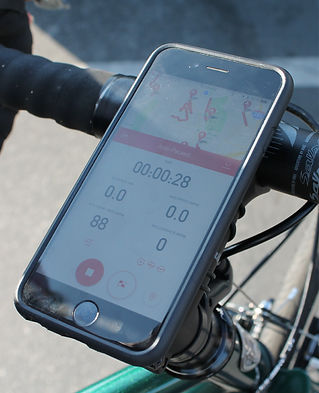
Zumith
Zumith Ultimate Road Bike is designed for the Avid Rider, a non-professional, advanced-level road biker. At this point in their development this user typically rides one singular bike so we designed Zumith to give them every tool they needed. It's customizable to be the perfect bike.
Fall 2016
My Role: Trend Research | Competitive Landscaping | User Research | Strategy | Product Design | Design Strategy | Story Boarding and Illustration
Team:
Sara Ferris
Ian Liao

Design Challenge
Our assigned prompt was to design a bike for the Rose Bowl Road Bike Rider. Through the course of the class we researched real bikers, created and tested the perfect form and generated a bike experience like no other.
Solution
Zumith Ultimate Road Bike is designed for the Avid Rider, a non-professional, advanced-level road biker. At this point in their development this user typically rides one singular bike so we designed Zumith to give them every tool they needed. It's customizable to be the perfect bike.




RESEARCH
Target User
The Avid Rider

I'll never own a sports car, so spending $15,000 on the perfect bike really wasn't a big deal."
Through our research we encountered many Avid Riders. They are a group of intermediate to advanced riders that actively pursue road biking as a hobby, a way to interact with friends and truly a lifestyle.
"
First Person View
We sent road biker, Chance out with a GoPro to ride with his regular crew to observe what actually happens inside the pack.




Hive-Ride Insights

Aesthetic and Function
Hold Equal Value
Users want the function of a properly broken in equipment as well as the latest gear. This user covered his beat-up shoes with a black sock with hole cut in the bottom to uncover his cleat.
Bike Frames Sometimes
Double as Storage
The Avid Rider always needs to keep their bike in top shape. Sometimes that means pumping their tires halfway around the track like this user, who keeps his bike pump flush against his top tube.
GPS Tracking Apps are Personal Preference
Different users prefer different gps systems and tracking apps. Some use apps like Stava and others prefer Garmin devices. This rider used Strava to compete with friends and stay motivated.
Developing the
Perfect Form

Changing the Form Required Validation
The road bike industry has performed countless tests to ensure the optimal design of their bikes, so changing the form drastically required that we too test the performance of the bike.
We used Solidworks' Simulation Solutions to run a hydrodynamic test on the form and project how the aerodynamics might impact factors like speed and torque.
_PNG.png)
TEST MODEL NO. 1
ALTERATION: Decreasing the space between the top, down tube, and head tube.
LEARNING: The space between the tire and the down tube didn't make much of an impact. The flow wrapping around the down tube created drag.
_PNG.png)
_PNG.png)
_PNG.png)
_PNG.png)
TEST MODEL NO. 3
ALTERATION: Once establishing we were going to use the bike with a sleeve to cover it, we created a large area in the front to address model no. 1 but also ensuring it didn't become a sail.
LEARNING: The flow over the down tube was significantly better and the fabric slip concept would not be an issue as long as the surface wasn't too large.

Final Design
Skin & Bone Concept
Replaceable Skin
3D printing a metal frame that has a fabric sleeve fitting over the form enables:
1. Peeling open to the sleeve to add sensors that track performance inside the frame
2. Matching any kit
3. Creating a lightweight and aerodynamic form


Features That Enable Optimal Performance


Adding Sensors Within the Frame
The bike has the abilities to add sensors and take messurements such as tilt and pressure
Measuring
Performance the Same Way as a Coach
Adding sensors makes growth trackable and riders progress quicker honing nuance factors such as tilt and pressure.

Building the Full-Sized Model



